News & Media
Unisa commemorates Es'kia Mphahlele
Unisa continues to celebrate and preserve the legacy and life of the late E’skia Mphahlele, the South African writer, educationalist and artist, who is widely regarded as the Father of African Humanism and a founding figure of modern African literature. This was again the case during the 10th Annual Es’kia Mphahlele Memorial Lecture, hosted in Polokwane, on Friday 27 September 2019.
Mphahlele, a leading scholar and literary icon, with a global reputation, rose through the ranks of academia to become a leading academic and an esteemed professor of English, who taught at several universities across the world.
The memorial lecture was themed "Es'kia Mphahlele, African writer, prophet and catalyst", based on his views of the role that institutions of higher learning could play to produce responsible, accountable and ethical leaders within the context of transformation. The lecture was attended by students, alumni, politicians and captains of industry.
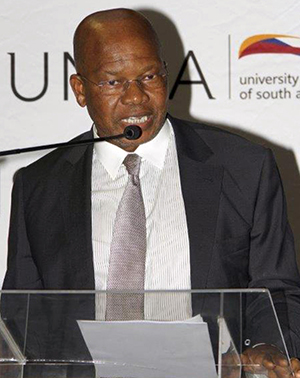
Dr Reuel Khoza during his presentation of the 10th Annual Es'kia Mphahlele Memorial Lecture.
Dr Reuel Khoza, Chairperson of Dzana Investment, the Assupol Group and the Public Investment Corporation, delivered the lecture and he acknowledged that Mphahlele's lasting and lingering legacy was indelibly etched in the history of the land.
Khoza described Mphahlele as a symbol of South African resilience and a custodian of time-tested wisdom. He described Mphahlele as a friend to other writers. "He was collegial, he nurtured the fraternal aspects of working for his continent. He was forever creating networks and partnerships. These are our values, we value the collective and it is only through nurturing partnerships that we can develop a distinctive, powerful network in support of our continent and, thus, achieve the Nepad goal of an African Renaissance and Pan-Africanism. His credo was his energy, discipline, purpose, enlightenment and love for this continent. We also cherish these attributes," Khoza stressed.
Sharing his fondest memories of Mphahlele with the audience, Khoza recalled how Mphahlele attacked the Bantu Education Act with the zeal of a man condemned. "He criticised the Eiselen Report on African Education, decrying that it was going to divide black education. His reservations, as well as that of a string of excellent black intelligentsia, were confirmed, because never again did we achieve such a high concentration and abundance of dedicated educational talent."
Khoza continued to say that many South African artists were consumed by, and eventually perished during, the long, bland and sterile years of exile, but for Mphahlele and others, the wilderness was the crucible. "Even though he had immersed himself in the Nigerian reality, even though he had taken to writing in Pidgin English, he was still distinctly ours. His hallmark was still the bright vigour of the 1950s. The vivid forcefulness of someone, whose soul had been touched by Sophiatown and Soweto, still lived on his work. The lucidity of thought, gained in the social debates of the Johannesburg of his time, was always evident. The social commentary was typically Mphahlele. We are celebrating him, because his sheer energy and vitality resonate with who we are. The notion of his work and the work of other black writers, at home and in the diaspora, as well as the music of Shalati J Khosa, who holds that rivers are a source of life, have meaning for us," Khoza said.
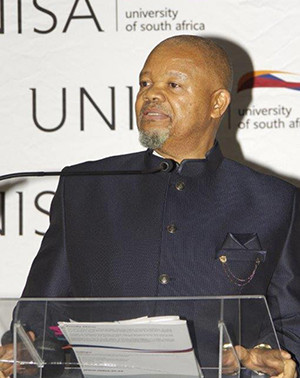
Prof Mandla Makhanya, Principal and Vice-Chancellor, Unisa.
Prof Mandla Makhanya, Principal and Vice Chancellor of Unisa, said the series of Mphahlele lectures assisted in demonstrating that, although Mphahlele used the medium of literature and literary studies, he was more than just literary figure.
He said Mphahlele bequeathed to our society African humanism and ubuntu. "Ubuntu anchors who we are as people, as human beings. There cannot be ubuntu without the central place being held by and there being respect for people. As such, ubuntu, then, is the wellspring flowing with African ontology and epistemology."
"It is with this critical self-searching that we, over and above the priority of identifying and addressing the socio-economic causes of femicide and gender-based violence and in addition to strengthening our criminal justice system, try to find answers to the challenges of our times. At the core of our attempts to address this, and the many other societal challenges that we face, should be the humanism that Mphahlele talked about. It is this humanism which can firmly anchor our quest for a decolonised higher education system that is in the service for all of humanity."
Prof Makhanya acknowledged Mphahlele’s considerable contribution to the development of modern African literature, but expressed regret that he, rather tragically, is also one of the few black South African writers who stands out as a much neglected, generally underestimated and often misjudged writer. "There is still a lot of work to be done by academics in terms of giving due prominence to Mphahlele's immense literary and scholarly output, possibly by way of prescribing it in our literary studies courses at universities. Even the laudable initiative that culminated in the establishment of the Es'kia Institute was his brain child. It would be interesting to know the number of departments of English literature that prescribe and teach Mphahlele's works in South Africa. It would also be interesting to know how many of our provincial and national departments of education have included Mphahlele's works in the curriculum," Makhanya said.
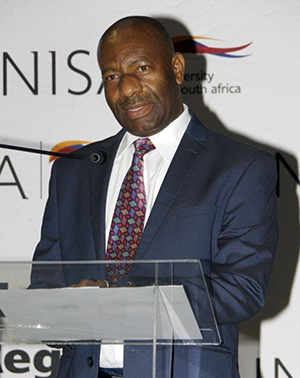
Prof Moloko Sepota, Regional Director, North Eastern Region, Unisa.
Prof Moloko Sepota, Regional Director of Unisa North Eastern Region, said Mphahlele would have been 100 years old this year, had he been alive. "Mphahlele was called to eternal rest in October 2008. More than ten years down the line, he still brings us together. His voice still compels us to ask difficult, but important questions, and to speculate about what he would have said about our current situation. Mokgaga did not leave a void behind, but a legacy that continues to shape educational debates about transformation," Sepota said.
During the celebrations, Unisa announced the winners of the Es’kia Mphahlele Creative Writing Competition. Adjudication for this competition took place on 27 September 2019. This short story writing contest was conceived to create awareness about Es’kia Mphahlele’s literary works and his legacy. It is also aimed at stimulating creative writing among students and to encourage them to read and write, in line with Mphahlele’s vision of creating an inquisitive, informed and educated society.
John Caswell Sambo was announced as the overall winner of the competition for his short story entitled The Tale of Lumanzi. Sambo won a laptop. Teddy Mapule Mosehle’s short story, Don't Hurt Yourself, earned her the second place and Patricia Makwela was the second runner-up with her story, Raising my Dreams, while Raising my Child.
* By Herbert Rachuene
Publish date: 2019-10-30 00:00:00.0

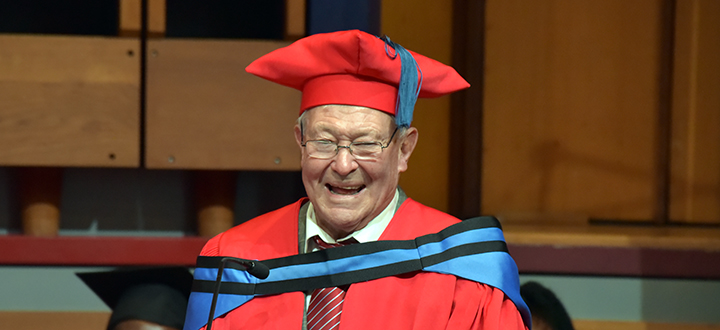 Community champion and agricultural entrepreneur extraordinaire honoured by Unisa
Community champion and agricultural entrepreneur extraordinaire honoured by Unisa
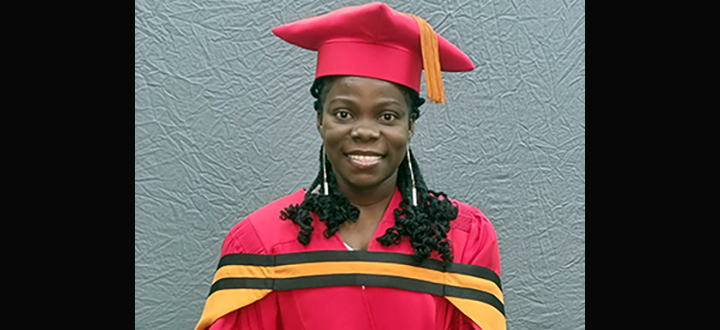 Ghanaian-born Swede earns PhD in Information Sciences from Unisa
Ghanaian-born Swede earns PhD in Information Sciences from Unisa
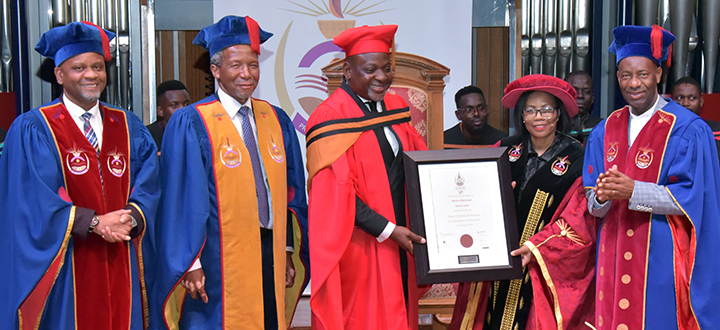 Unisa awards honorary doctorate to exemplary philanthropist and entrepreneur Collen Tshifhiwa Mashawana
Unisa awards honorary doctorate to exemplary philanthropist and entrepreneur Collen Tshifhiwa Mashawana
 Inhlanyelo Hub explores financing and sustainability at the International Conference on Business Incubation
Inhlanyelo Hub explores financing and sustainability at the International Conference on Business Incubation
 Unisa remains anchored among the waves
Unisa remains anchored among the waves